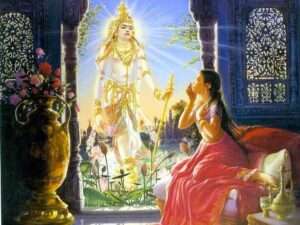King Sura, of the Vrishni lineage, had a son named Vasudeva and a daughter named Pritha. His cousin Kuntibhoja, on the other hand, had not been able to have children, so, Sura decided to give him the girl up for adoption. When the girl entered her uncle’s palace, she received the name of Kunti after having been adopted by Kuntibhoja.
Those were years of happiness for her, who with her graceful and amiable ways had won the affection of her adoptive parents and of all those who attended the court.
One day the sage Durvasa arrived in the city for a visit. The latter had great mystical powers, but was also particularly short-tempered. It was said that in moments of anger he could utter terrible curses with devastating results.
During the days he lived with them, Kunti served him with great effort, succeeding in the difficult task of satisfying him. Before leaving, Durvasa thought of rewarding her.
“Dear young girl,” said the Rishi, “you have served me with great commitment and loyalty, so I want to give you something that will be useful to you in the future. I will teach you a very powerful mantra with which you can call the presence of the Devas, who will be obliged to fulfill your desire.”
At that time, Kunti was little more than a child and did not understand what the sage meant by “your desire”. It actually referred to the desire to have children.
Several months had passed since the sage’s departure, when one morning Kunti, seeing the sun rise, was enchanted by the beauty of that celestial star. She wondered about how beautiful the Deva who ruled such a hot and fascinating planet must be, and she felt a strong desire to see him personally. It was then when she remembered the mantra Durvasa had taught her, and impulsively recited it, thinking of Vivasvan. Just a moment later, the room was flooded with dazzling light and there Kunti, protected by the mantra itself, found herself facing the much adored Deva. Suddenly, the young woman realized that she had acted superficially by calling a divinity in front of her solely for a childish game so, after reciting the mantra, she apologized to him.
“You don’t have to apologize at all,” Vivasvan replied with a smile, “because your attractiveness is such that it can attract even an inhabitant of the higher planets. Now I am here, ready to fulfill all your desires.”
It took Kunti some time to understand the truth, and when she realized it, she felt desperate.
“How can I have a child?” she said through her tears. “I’m not married yet, and if I did that, no one would want me anymore.”
“Don’t worry about it,” replied the Deva, “our son will be born immediately after our union, and you will not lose your virginity.”
Thus Karna was born.
At birth, he wore a natural armor and two wonderful earrings, which were one with the body. Kunti, entranced by the child’s extraordinary beauty and grace, felt a great maternal love being born within her; yet reason forced her not to let herself be carried away by feelings for which, placing him in a basket, she abandoned him in the current of the Ganges, having him be watched from a distance by a servant.
A few hours later the basket was picked up by Atiratha, a chariot driver from the Suta caste, and by his wife Radha who, having had no children and longed for one, adopted it.
Until the last tragic days of the Battle of Kuruksetra, very little was known about the story of Kunti’s union with Vivasvan.
This is a section of the book “Maha-bharata, Vol. 1”.
To buy the complete book, click above
Post view 647 times




Leave a Reply